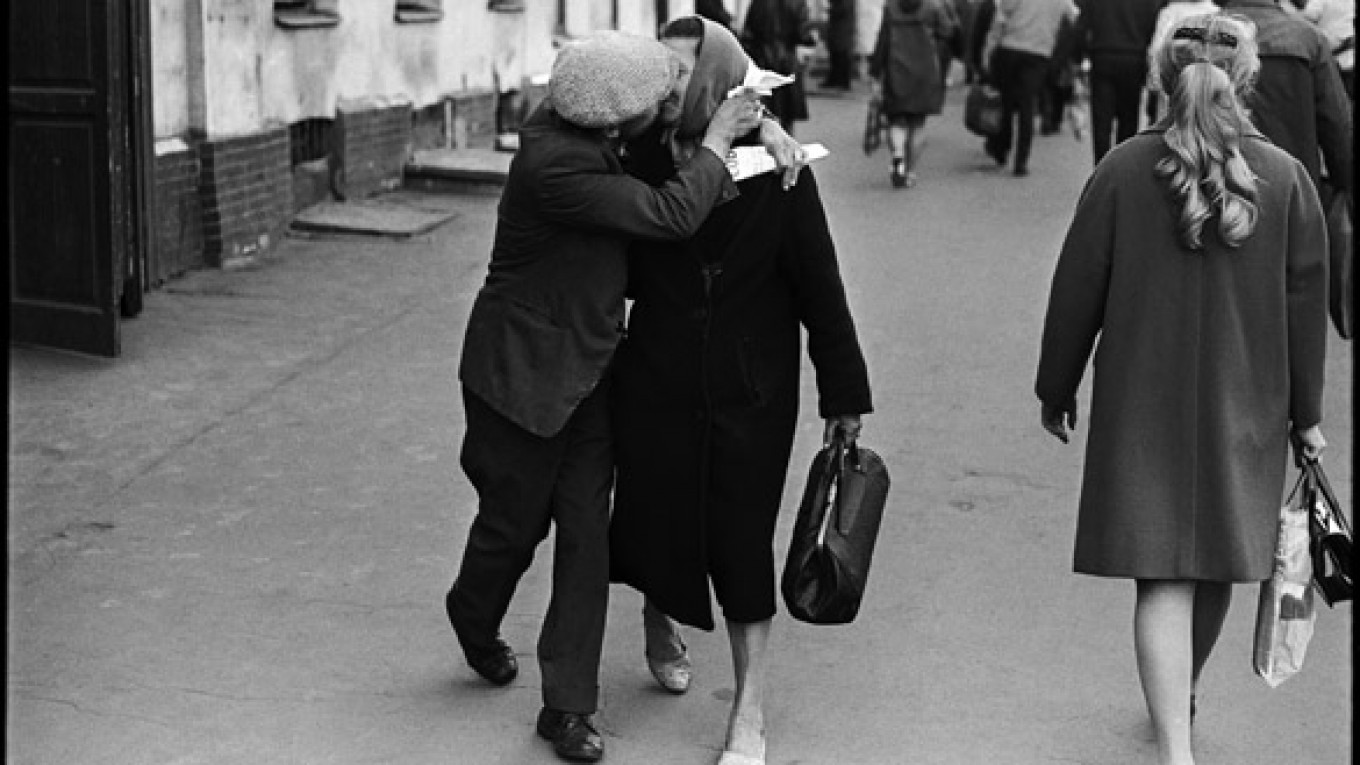Vladimir Sychyov’s photos regularly appear in Vogue, Stern and Paris Match, but now you can see, for the first time in Moscow, the photos that made his name ??— photos of the Soviet Union of the 1970s and the underground artists of that time.
One hundred black and white photos from Sychyov’s two collections, “Letters of the Nonconformist Art” and “Day-to-Day Life of the 1970s” are now on display at the New Tretyakov Gallery as part of the Third Biennale of Contemporary Art.
Sychyov left the Soviet Union in 1979, taking with him his entire photo archive. He was the only emigrating Soviet photographer who managed this feat. In 1980, his photos appeared in a special large-sized edition of Paris Match, but they have never been on display in their entirety in Russia.
Sychyov documented life in the Soviet Union under Leonid Brezhnev as a street photographer, taking pictures of what he saw around him.
The photos are, as Sychyov once said, of his favorite characters — ordinary Soviet people, like the middle-aged couple having a passionate kiss in the middle of the street, in a display that would have been considered shocking at the time.
“I haven’t been without a camera for 40 years,” Sychyov said, Gazeta newspaper reported on his visit to Moscow earlier this year.
He shows the city as it was, with buildings draped in the propaganda. “Under Ilyich” has a streak of people walking under a poster of Lenin so big that it looks as tall as the sky.
The second half of the exhibit shows one of the most traumatic incidents for the nonconformist artists who had spurned the Soviet line on art: the “Bulldozer Exhibition.”
It was an exhibition of nonconformist art that took place on a vacant lot close to the Belyayevo forest on Sept. 15, 1974, but it was viciously broken up with bulldozers, water cannons and hundreds of off-duty policemen. Famously, one policeman shouted at the artist, “You should all be shot, only you are not worth the ammunition.” Artist Oscar Rabin at one point went through the exhibition hanging from a bulldozer.
After the event was widely publicized in the Western media, a second exhibition was held in Izmailovsky Park two weeks later, an event which came to be known as the “Half Day of Freedom.”
Sychyov did not just record the life of forbidden artists in the 1970s but took an active part in it. He has called artists “the chosen people,” and they were a constant presence in his apartment.
Artists, many of whose portraits were on display at the exhibition, would come to his apartment to find sellers, often foreigners ???— an obviously dangerous activity in the Soviet Union. Three of his friends died in labor camps for anti-Soviet agitation. Sychyov was arrested for helping organize the “Belyayevo Exhibition.”
Sychyov has said everything he learned was from artists and that despite his success in the West, where he became the protege of Helmut Newton and has photographed the likes of Jacques Chirac and Yves Saint Laurent, he considers photography to be just a craft compared with the work of real artists.
Vladimir Sychyov’s photos are on show till Oct. 23. New Tretyakov Gallery, 10 Krymsky Val. Metro Oktyabrskaya, Park Kultury. Tretyakov.ru
A Message from The Moscow Times:
Dear readers,
We are facing unprecedented challenges. Russia's Prosecutor General's Office has designated The Moscow Times as an "undesirable" organization, criminalizing our work and putting our staff at risk of prosecution. This follows our earlier unjust labeling as a "foreign agent."
These actions are direct attempts to silence independent journalism in Russia. The authorities claim our work "discredits the decisions of the Russian leadership." We see things differently: we strive to provide accurate, unbiased reporting on Russia.
We, the journalists of The Moscow Times, refuse to be silenced. But to continue our work, we need your help.
Your support, no matter how small, makes a world of difference. If you can, please support us monthly starting from just $2. It's quick to set up, and every contribution makes a significant impact.
By supporting The Moscow Times, you're defending open, independent journalism in the face of repression. Thank you for standing with us.
Remind me later.


